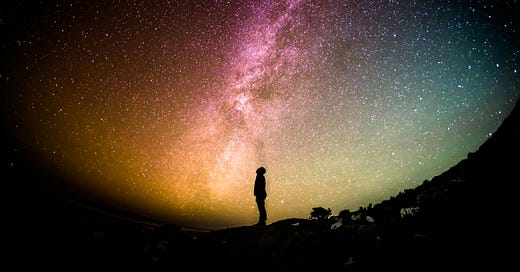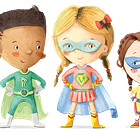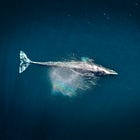Interview: Henrik Wilenius
On spirituality, hope, and the connections between queer and vegan identities
Welcome back to another Wizard of Claws interview!
Henrik Wilenius is a Finnish writer who shares my fondness for French pop. More importantly, however, he’s the author of the new adult Rise Up trilogy. The books’ trio of protagonists—Hashim, Maryam, and Alex—confront some of the most pressing issues of our time in the effort to make the world a kinder place for all who live here.
Questions with potential spoilers have been labeled
General Questions
Can you share a little bit about yourself, including how you came to care about animals and creative writing?
When I was a kid, I loved books about faraway countries. Since I was ten years old, my father would stack books on my desk to read. He probably saw that I loved to read, and I was very curious about the world. Then at the age of twelve I stumbled upon Siddhartha by Herman Hesse. It takes place about 2,500 years ago during the time of Siddhartha Gautama, aka Buddha, the namesake of the protagonist. There are a lot of similarities between this fictional character and Buddha, at least enough to get me very interested in Buddhism. This book really changed my life. I became aware of the spiritual world and the need to explore it further, and to do that, I needed to train my self-discipline, which I began by quitting candy and chocolate for year. I have continued this exercise in one form or another all throughout my life. It also very much affected how I look at the world. I realized that it’s not important how different I am from the other people, but what I have in common with them. This new-born curiosity made me delve into different cultures and religions since my early teens, and the understanding I gained over the years through people I met was the cornerstone of how I became a writer in my thirties.
Since I was a little boy, I loved animals. I could never join my older brothers to go fishing or my cousins to go hunting, which I found totally barbaric. In my progressive school back in Finland, they started offering a vegetarian choice for lunch in my teens, which I preferred. At that time, my sister and brother were already vegetarians, but it took a few years more for me to become a vegetarian while staying with my Buddhist Japanese girlfriend in Tokyo for a few months. We met on a cultural study program in the US. At the time, I hadn’t yet realized how much suffering the dairy industry was inflicting on cows. For a couple of summers, I would have chickens in my summerhouse, but I could never eat their eggs. Somehow, it didn’t feel natural. My first experience of veganism came when I joined a Zen Buddhist Center in Helsinki and started to meditate. In all their retreats and later in the Zen monastery in Sweden, they only served vegan food. I loved staying in the monastery, and I was seriously considering moving there, but I had already started to write my first book which I thought was more important.
My biggest inspiration to become vegan was Ella, our Japanese spitz. Through her, I learned how animals have real feelings, personality and sense of pain. At the same time, my husband and I started to delve into veganism by reading and watching videos. Like many vegans, seeing Earthlings shut the door behind us. There was no going back, and we decided to go full vegan. I’m so glad we went through this process together. This kind of a deep spiritual bond lays a foundation to an enduring relationship.
Many of us have childhood dreams of becoming a writer. When did you decide to give it a shot?
I never thought I was going to be an author, although my two older brothers, my sister, my father, my grandfather and my great uncle were writers. In my early twenties, I founded a contemporary art servicing company. We would store and transport art for artists, museums, and collectors. The artist could also sell their pieces through us. After an initial success, I ventured out to real estate development and market research. But something was not right. By living the high life, I was neglecting my spiritual needs. I decided to radically downsize and went back to university to study philosophy, because I was obsessed with the question of why it was so hard for us to expand our understanding. And when I found the culprit, I became a writer. It was supposed to be an essay on Rhetoric by Aristotle, but only after half an hour of writing, I knew it was going to be a full-length book. End of Restlessness, a philosophical study into my own coming-of-age, was published in 2001. Soon I realized that if I really want to relay my understanding, I needed to write fiction, namely young adult fiction, because that’s the genre where post-modernism doesn’t reign, at least in Europe. And I’ve been on that road now for over twenty-five years.
Most animal advocacy focuses on creating tangible changes in the real world. What role can the arts play in changing how people think about animals?
When I was writing my first book, I thought it would be just my take on Western philosophy and what’s wrong with it, but then I came to realize that if I really want to get through to my readers, I need to tell stories. That’s the age-old method of passing wisdom. Besides a few dystopian novels, there is not much fiction out there that tackles animal rights or the climate crisis in a modern setting. Also, there are very few stories about how to make a difference, but this is what we really need now in these difficult times. All the big changes in society through history have been the result of a small number of dedicated people, who relentlessly pushed their agenda until their cause reached a wider audience. We need grassroots action, and I think arts can play a big role in getting people involved. It might take time until big publishers or movie producers get the memo, but with perseverance, eventually they will.
What can animal advocates learn from fiction/storytelling?
As I said before, human history proves that stories are the best way to relay new ideas. I have over 170 reviews on Amazon and Goodreads, maybe 70% of them five-star with 4.6 average, and that’s a big number for a self-published title by an unknown foreign writer. From the way these reviews were written I assume that almost all of them have been written by non-vegans. If this is the case, it goes to show that in fiction, vegan propaganda doesn’t alienate the readers, which it might do when you just lay down the facts. I think many advocates somehow overlook the power of storytelling in more traditional forms like a novel. I have to say that I’ve been really surprised by the lack of interest in my trilogy among the vegan advocates. Although I’ve contacted close to a hundred vegan influencers, you are the first one who has read the trilogy and wants to post something about it.
There are always a million other things vying for our attention. What do you do to make the best use of your writing time?
I think one of the most important skills for a writer is self-discipline, and it can be achieved only through long practice. There’s no shortcut here. Another big factor is that you must tell your loved ones and close friends not to bother you when you’re writing. It might not be easy, and you must repeat yourself ad nauseam, but you must get them to respect your writing space. And turn that phone off!
What’s the vegan scene like in Finland?
I think the vegan scene is very lively in Finland. There’s a constant flow of direct action, and veganism is quite a popular subject in the media. Vegan food is widely available in Finland. Even small grocery stores in the provinces carry an abundance of vegan products on their shelves, and most of the restaurants have vegan choices although they are not listed in Happy Cow. Many schools also offer vegan lunch, and many cities have adopted a policy to serve only plant-based food in their events. Even the chairman of our right-wing populist party is a vegan who wears second-hand clothes and talks about recycling.
Story Questions
How did the idea for the Rise Up trilogy first come to you?
I published years ago a YA novel in Finland about three best friends at the threshold of adulthood which was inspired by my fifteen-year stint as a volunteer in a Red Cross youth shelter. I wanted to get it published it abroad, but I felt something was missing. Since my early teens I’ve been fascinated by Islam. Sufism, the mystical sect of Islam, played a key role in my own spiritual awakening and spurred me to become a writer. Then one day as I was browsing in a bookshop in Amsterdam, I came across Sex and the Citadel by Shereen El Feki about Arab sexuality, including the history of homosexuality in the Arab world. During the Golden Age of Islam, homosexual yearnings were very well tolerated, even celebrated among the poets, intellectuals and upper echelons of society. What happened to this open-mindedness over the centuries really captivated my imagination, especially since I knew from Sufism how forgiving and merciful Islam is. The third big inspiration came from within as I became vegan myself and saw how for our pleasure, we are not only ruthlessly killing animals but also ourselves while destroying our planet in the process.
Faith plays a central role in the trilogy. Not just religious faith but faith in love, friendship, community, and humanity. Is that inspired by your own life?
Yes, it is, indeed. I learned it from my parents, who dedicated their lives to bringing about a better world through education. Like me, my father had a spiritual awakening in his early teens. In his case, it was through reading about theosophy and the writings of Rudolf Steiner, an Austrian social and educational reformer. I think it was the passion he drew from his newly found faith that swept my mother off her feet at the tender age of fifteen and cemented their productive, enamored journey through life. But it’s not only my parents who have been a big source of inspiration. In my quest to find commonalities with people across continents and cultures, my life has been filled with countless encounters with inspiring individuals.
Each book focuses on a major issue in society today: homophobia, animal agriculture, and climate change. (Not to mention media bias and government corruption.) Why was it important that the Rise Up trilogy addressed these topics?
I think these themes stem from my own activism in these areas. I’ve been an activist whole my life. Especially the two last issues have been almost totally absent from YA fiction, although they’re the ones that really worry young people.
[SPOILER] After meeting a lovable piglet at a sanctuary in Merry Farm, Hashim decides to film his coming-out video there. In your own life, what connections, if any, do you see between being gay and being vegan?
I love this question. For any person, coming out as your true self (which Maryam points out in Catch You If You Fall), be it gay or straight and anything between and beyond, is the key in finding your path, and on that path, becoming a vegan could be the logical next stop as through it, you find the real power and meaning of compassion, which all the different religions tout as essential for our own redemption.
After learning about the mutilations chickens undergo even on organic, free-range farms, Alex says, “It’s us humans. We’re the monsters.” But Alex, Maryam, and Hashim show that humans are also capable of change and fierce compassion. What do you hope readers will learn about human nature from your books?
Good stories have an ability to lift people out of their self-absorbed microcosm and connect them to the world around them. By reading my books, readers can get first-hand experience how their own ignorance causes suffering to other sentient beings and hopefully it will start a process that leads them to question their own behavior and beliefs and eventually find the true meaning of compassion by becoming vegans themselves.
Hashim says that Merry Farm isn’t the enemy, ignorance is. That struck me as quite a profound and mature thing to say, especially for a new activist, and it resonated deeply with my own view of the world. How do you think vegans can better advocate for animals without alienating potential (non-vegan) allies?
First, I want to say a few words about Hashim’s realization. Fighting ignorance is imbedded in Islam through the idea that everybody should become a Khalifa, a responsible and ethical person. This means to strive to gain authentic knowledge of one’s own nature, in other words, fighting ignorance within you. This is also a concept that you can find in almost all religious and spiritual traditions.
As I pointed out above, my reviews show how effective stories are to advocate for animals without alienating potential allies. Rather than repeating what I’ve written on how to advocate for animals in my books, I would strongly recommend “Saving Ourselves” by Dana R. Fisher for an expert take on the subject. She writes about climate change, but I think the same applies to animal rights. According to her, the only way possible to get people to take real action on climate change is through pain and suffering through climate shocks. In other (my) words, we humans only learn through real misfortune, which applies to both micro and macro levels. A cancer survivor often makes lifestyle changes only after near death experience, and similarly, we humans as a species will swing into action only after we have come face to face with destruction caused by our inaction.
After giving us the riot act, Dana R. Fisher writes at length what everybody can do to mitigate climate change, pointing out that although individual input is necessary, without systematic change we will never reach our goals. Her advice is practical and very down-to-earth. She makes a case for more confrontational activism (the radical flank), citing research that shows its effectiveness, and she encourages us to learn tactics from the civil rights movement.
In Catch You If You Fall, Hashim says, “This pain I had–I realized it wouldn’t disappear anywhere. I would only pass it along to people I love…” Even in his darkest moments, he finds hope in the people who love him. What gives you the strength to keep going even when things seem hopeless?
An intriguing question came up yesterday with my friend Peter, who’s celebrating his 99th birthday tomorrow. Usually on Thursday evenings, I take him out for a stroll on the seaside promenade in our picturesque hometown nestled between coastal mountains next to Barcelona. Earlier this week, a local queer magazine (they still exist!) wanted to write an article and asked him what the happiest ten years of his life were, and he had replied it was now. He’s still living alone in his apartment, making his meals. His mind is clear and full of curiosity, but his body is failing him. With chronic pain and bound to a wheelchair, how could he claim to be happy?
Peter was drafted into the Royal Navy at the age of seventeen towards the end of the Second World War and served in the Pacific. He never saw action, though, at least at this point in his life. When he returned to England a few years later, he joined the Jesuit brotherhood and worked helping immigrants from the West Indies in London. After five years, he realized that being a brother and gay was incompatible, and he joined a US relief organization and witnessed war in the Congo, famine in Ethiopia, and genocide in Cambodia, among others. We have often talked about his experiences in these places, and I’ve always been in awe of his resilience and sense of hope. I guess when you’ve seen the worst of humanity, you’ve got to face your own demons in order to stay sane. By design, disasters tend to bring people together. I guess it's embedded in human nature to help those in need, and it opens the door to hope in the most horrendous circumstances. Still, he might have been worried how he would manage in old age, estranged as he was from his family back in England and with limited financial resources. However, those fears were washed away as friends and strangers rallied to help him when he was in need. This might be the reason for his unexpected happiness in recent years. And maybe I’ll ask him that next Thursday?
As I’ve been looking for vegan authors to interview, I’ve found that many books feature children or young/new adults as the protagonists. Why do you think younger generations often take leading roles in stories about social change?
There are many reasons for that. First, it’s their job from the times immemorial. As we age, we conform, unfortunately. We lose the spark needed to fight injustice and become cynical. If there’s no hope, there’s no fight. Second, it’s the publishing industry. Adult literature is mostly postmodernist tales where there’s little hope. In short, life’s shit and then you die. There’s no big story, spiritual evolution, no hope. For postmodernists, compassion is a naïve concept and the sooner you get rid of it, the better. But young people are still open, ready to learn new things, ready to listen.
After publishing two books in Finnish, why did you switch to English and set this trilogy in the United States?
In order to get published in Finland, you have to write about Finnish people and things happening in Finland. That’s not my world. Since my early teens, my interest has been other cultures, other religions. Of course, I first had to understand where I came from to understand others, but I have to say that I’m against all kinds of nationalism, including cultural. It was natural for me to place the story in the US, because that’s where I’ve lived the longest besides Finland. Over the years, I’ve been to maybe 30 different states, staying usually with local families or friends. I graduated from John F. Kennedy high school in Sacramento. Also in the US, people of all ages read young adult novels, and I find American society to be the most dynamic and open to new ideas.
How has your experience self-publishing differed from traditional publishing? Any advice for self-published authors?
I loved having a publisher. They took care of everything. For my first book, End of Restlessness, my publisher threw a big book launch party in their beautiful offices, offering food and drinks, and giving out free copies of the book to the attendees. Also, there were three TV stations and a bunch of other media, too. For the first month, they arranged a slew of interviews almost daily. With the second book, there was much less publicity, as it was YA book, but still they flew me to attend book fairs, etc. Fortunately, or unfortunately, I don’t yet know, I couldn’t find a publisher for the Rise Up Trilogy. I think one of the reasons is that there’s nothing like it in the market. You cannot benchmark it, and it would be a big risk for the publishers. Maybe they also considered the themes to be too controversial. Thus, I didn’t have choice, but to my surprise, I’ve actually enjoyed the process and learned a lot. But now I’m looking for a publisher for the graphic novel version of the Rise Up Trilogy, and I think I have a much better chance of finding one since the trilogy has so many positive reviews.
Closing Questions
How can readers find you and your stories online?
The best way to find me is through my website: henrikwilenius.com. For Instagram and TikTok I have the same handle: @henrikwileniusauthor. You can also listen to my serialized audiobook podcast on all major platforms through this link.
Any upcoming projects?
I’ve found a very talented young Muslim comic artist from Indonesia who’s illustrating Catch You If You Fall from the comics script I wrote. Now, I’m in the process of turning Merry Farm and Collusion into a comic script, and I’m very excited about this project.
Anything else you’d like to share?
In a world that is turning into an increasingly hostile place for any minority, what people need is stories that evoke diversity, friendship, human decency, and the courage to listen to one’s heart.









What a great read! Thanks for this. I'm loving that this author is spiritual and writes about it in his YA books. Will be looking him up for sure.